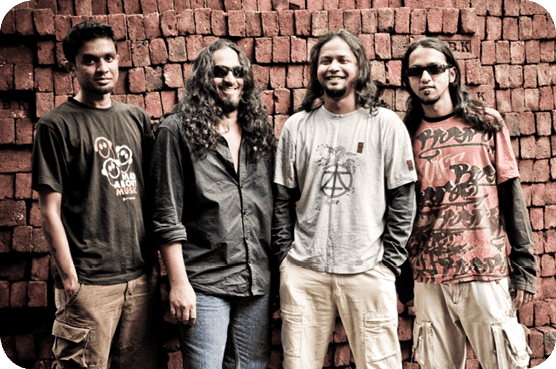If you are living in the West, chances are that in any mention of Indian music, the unmistakable reference is to the sitar or the tabla. But a new generation of musicians are all out to prove that there is more to music in India than just the ragas.
Although classical Indian music has long been a gateway for many Westerners to discover India, a young generation of Indians are experimenting with plays on sex and other societal issues in their lyrics.
Mumbai based, rock-n-roll band, Overhung, is making waves with such sexually explicit lyrics as:
She likes it with the girls,
she likes it with the boys,
She likes it all alone,
She Loves her toys.
Band member Sheldon Dixon, says: “We think everyone in the country would want to talk about sex in an uninhibited way, but it is the culture and the norms that stop them. We believe, music is the best way of communication.”
So, is sexually racy music likely to become the dominant trend in Indian contemporary music scene, like in the West? Musician Howard Pereira of Overhung says: “I think there are sexual overtones in all music. We are a little more direct since we play glam rock. But everything from Bollywood to Indie music is pushing sex in some form or the other. I think the sexual innuendo in Bollywood music is extremely poor in taste.”
While this new trend is fast catching on, “However, make no mistake, this trend in no way reflects, the majority of India,” cautions Delhi based music and film critic, Arnab Banerjee: “The dichotomy of India remains in the fact that well, there are 20,000 different Indias within India! So, while a certain urban section of youngsters is certainly ready to enjoy explicit lyrics in music after having satiated themselves with electronica, folk rock or blues there are others in the interior pockets who would find any direct mentions almost blasphemous.”
Honey Singh, criticized for his vulgar lyrics became the highest paid Bollywood song artist.
And glam rockers may not be the only ones in India trying to mimic the Western trend. As Bollywood, Bhangra and fusion pop began gaining ground in India, the singer Honey Singh shot to fame with what critics lambasted as vulgar, sexual and misogynist lyrics. Despite many attempts to ban his music, Honey rose to become among the highest paid Bollywood song artists.
The newly fangled craze is latching on to global trends. According to a study titled, Exploring Six Decades of Number One Singles, more than two-thirds of Billboard 100 number one songs in 2017 featured explicit lyrics. The report found an 833 percent spike in songs with explicit lyrics since 2001.
However, Overhung’s Periera insists that open dialogue on sex and other relevant issues through the medium of art is healthy: “Yesterdays youth are todays adults and this cycle tends to ensure we learn. Dialogue about sex at an early age is not as much of a taboo anymore, but still that’s relegated to too few and far between. Unwanted pregnancies, STDs, female infanticide, not to forget peer pressure and stress, can all be dealt with in an informed manner if we are open to communicate about sex.”
Music critic Banerjee concurs: “It may be better to nail the issues directly than skirting it under the carpet that Indians have been doing for centuries.” And the movement is perhaps not restricted to music. He cites another example: “Today a film about menstrual hygiene called Padman got released in India amidst such fanfare. I doubt if a decade ago the subject of this movie would have gotten a patient hearing during censor board meetings, let alone the biggest stars coming and being part of the project. So, an eagerness to talk about real issues as they happen in life is surely apparent in the country.”
The rise of streaming services and independent artists exploring different genres ranging from hip-hop to rap has contributed to the openness. As has easy access to global access to artists on the Internet. Kanye Wests’ sexual undertones in his hit Famous, strike a chord amongst the upwardly mobile class in India.
Banerjee says that for far too long we have had a culture of bawdy jokes and double entendre in songs. He recalls growing up in Meerut, a small town in Uttar Pradesh: “Every time there was a wedding in neighborhood, there used to be a sangeet night and the songs sung during these nights were so misogynist and suggestive that any self-respecting man would die of shame listening to them. The sneers, jibes and giggles on hearing those lyrics are any day more regressive than listening to a direct grown-up reference. So, well, I would say the change may be gradual and reflective in only a certain section of society and whether it’s because of western influence or due to the after effects of globalization, if it is educative in any way, it cannot be such a bad thing.”
